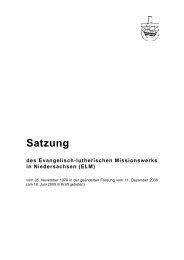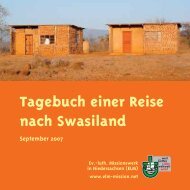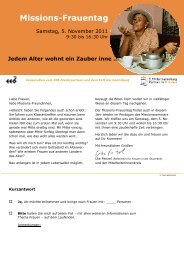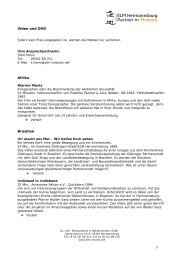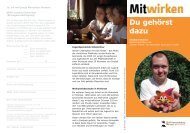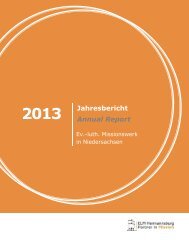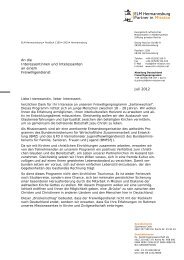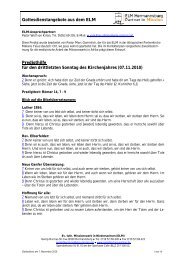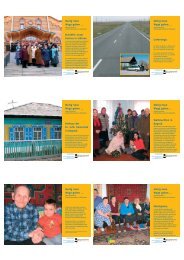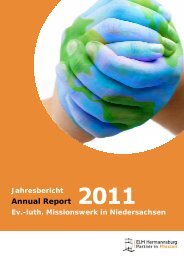Jahresbericht 2012 - Ev.-luth. Missionswerk in Niedersachsen
Jahresbericht 2012 - Ev.-luth. Missionswerk in Niedersachsen
Jahresbericht 2012 - Ev.-luth. Missionswerk in Niedersachsen
Sie wollen auch ein ePaper? Erhöhen Sie die Reichweite Ihrer Titel.
YUMPU macht aus Druck-PDFs automatisch weboptimierte ePaper, die Google liebt.
FIT für missionarische<br />
Partnerschaft<br />
Eigentlich waren es nicht die f<strong>in</strong>anziellen Entwicklungen<br />
der letzten Jahre selbst, die e<strong>in</strong>e Weiterführung<br />
des Missionssem<strong>in</strong>ars <strong>in</strong> der bisherigen Form nicht<br />
mehr zuließen. Dass die Trägerkirchen ihre Zuschüsse<br />
mit der Begleitbotschaft kürzten: „Wir können und<br />
wollen neben der theologischen Ausbildung an der<br />
Gött<strong>in</strong>ger Universität ke<strong>in</strong>e zweite theologische Vollausbildung<br />
f<strong>in</strong>anzieren“, war auch Ausdruck missionstheologischer<br />
Überlegungen, die vom ELM forderten,<br />
die Entwicklungen der letzten Jahrzehnte <strong>in</strong> den aus -<br />
ländischen Partnerkirchen <strong>in</strong> der Ausbildungs- und<br />
Entsendungspraxis zu berücksichtigen. E<strong>in</strong>e Fortführung<br />
des Missionssem<strong>in</strong>ars <strong>in</strong> der überkommenen<br />
Form wäre nicht nur aufgrund der schrumpfenden<br />
Studierendenzahlen und der s<strong>in</strong>kenden Zuschüsse<br />
nicht mehr länger möglich gewesen. Die Tatsache,<br />
dass die theologischen Ausbildungen <strong>in</strong> Gött<strong>in</strong>gen,<br />
Gurukul, Pietermaritzburg oder Makumira ebenfalls<br />
hoch qualifizierte Theolog<strong>in</strong>nen und Theologen hervorbr<strong>in</strong>gen,<br />
ließ den aufwändigen Hermannsburger<br />
„Sonderweg“ der sem<strong>in</strong>aristischen theologischen Vollausbildung<br />
zunehmend unzeitgemäß und theologisch<br />
fragwürdig ersche<strong>in</strong>en.<br />
Darum wurde <strong>in</strong> den letzten Jahren die Konzeption für<br />
die Fachhochschule für Interkulturelle Theologie (FIT)<br />
entwickelt. Damit haben wir e<strong>in</strong> Studienangebot, das<br />
nicht nur den Fortbestand der missionarisch-theologischen<br />
Aus- und Fortbildung <strong>in</strong> Hermannsburg sichern<br />
kann, sondern auch auf die Bedürfnisse der Partnerkirchen<br />
genau zugeschnitten ist.<br />
Zwei bedarfsgerechte Studiengänge<br />
Neben dem Master-Studiengang Intercultural Theology,<br />
der von der Theologischen Fakultät der Universität<br />
Gött<strong>in</strong>gen <strong>in</strong> Kooperation mit der FIT zu etwa<br />
gleichen Lehranteilen weiterh<strong>in</strong> angeboten wird,<br />
s<strong>in</strong>d nun auch zwei weitere Studiengänge von der<br />
Zentralen <strong>Ev</strong>aluations- und Akkreditierungsagentur<br />
(Z<strong>Ev</strong>A) <strong>in</strong> Hannover akkreditiert worden. Dies s<strong>in</strong>d der<br />
B.A.-Studiengang „Interkulturelle Theologie, Migration<br />
und Geme<strong>in</strong>deleitung“ und der B.A.-Studiengang<br />
„Missionswissenschaft und Internationale Diakonie“.<br />
Der erste Studiengang wendet sich <strong>in</strong>sbesondere an<br />
– meist ehrenamtliche – Leiter und Leiter<strong>in</strong>nen von<br />
Migrationsgeme<strong>in</strong>den und verfolgt das Ziel, Menschen<br />
aus unterschiedlichen ethnischen und konfessionellen<br />
Kontexten zur <strong>in</strong>terkulturellen theologischen<br />
Gesprächsfähigkeit und zur kritischen Ause<strong>in</strong>andersetzung<br />
mit der eigenen Tradition und Herkunft zu<br />
qualifizieren und somit zur Integration beizutragen.<br />
FIT for Missionary Partnership<br />
Actually, it were not the f<strong>in</strong>ancial developments of the<br />
past few years which no longer allowed cont<strong>in</strong>uation<br />
of the mission sem<strong>in</strong>ar <strong>in</strong> its previous form. That the<br />
support<strong>in</strong>g churches shortened their subsidies with the<br />
accompany<strong>in</strong>g message “we are not able to and do not<br />
wish to f<strong>in</strong>ance full theological tra<strong>in</strong><strong>in</strong>g <strong>in</strong> addition to<br />
the existent program at the University of Gött<strong>in</strong>gen”<br />
was also an expression of theological considerations<br />
regard<strong>in</strong>g missions that required of ELM that ELM take<br />
<strong>in</strong>to account the developments of the past few decades<br />
<strong>in</strong> the partner churches of other countries <strong>in</strong> the practical<br />
areas of tra<strong>in</strong><strong>in</strong>g and dispatchment. It is not solely<br />
because of decl<strong>in</strong><strong>in</strong>g enrollments and subsidies that<br />
cont<strong>in</strong>uation of the mission sem<strong>in</strong>ar <strong>in</strong> its traditional<br />
form would no longer have been possible. The fact that<br />
the theological courses of study <strong>in</strong> Gött<strong>in</strong>gen, Gurunkul,<br />
Pietermaritzburg and Makumira were likewise<br />
produc<strong>in</strong>g highly qualified theologians gave reason<br />
to regard the elaborate Hermannsburg “special way”<br />
of theological education <strong>in</strong> sem<strong>in</strong>ars as <strong>in</strong>creas<strong>in</strong>gly<br />
anachronistic and theologically questionable.<br />
This is why the concept of a college for <strong>in</strong>tercultural<br />
theology (“FIT”) was developed. It provides a program<br />
of studies that can secure cont<strong>in</strong>uation of the evangelistic<br />
theological tra<strong>in</strong><strong>in</strong>g programs <strong>in</strong> Hermannsburg<br />
and is precisely tailored to meet the needs of the<br />
partner churches.<br />
Two Courses of Study Tailored to Suit Needs<br />
In addition to the masters program for <strong>in</strong>tercultural<br />
theology, which will cont<strong>in</strong>ue to be offered by the<br />
department of theology at the University of Gött<strong>in</strong>gen<br />
<strong>in</strong> collaboration with FIT, with each bear<strong>in</strong>g<br />
approximately half the teach<strong>in</strong>g load, there are now<br />
two additional courses of study that have been accredited<br />
by the Central <strong>Ev</strong>aluation and Accreditation<br />
Agency (Z<strong>Ev</strong>A) <strong>in</strong> Hannover. These are the bachelor<br />
programs “Intercultural Theology, Migration and<br />
Congregation Management” and “Missionary Science<br />
and International Welfare and Social Work”. The<br />
first of these programs is designed especially for the<br />
leaders of migration congregations, most of whom<br />
work <strong>in</strong> an honorary capacity. It pursues the objective<br />
of contribut<strong>in</strong>g to <strong>in</strong>tegration by qualify<strong>in</strong>g people<br />
from a variety of ethnic and denom<strong>in</strong>ational contexts<br />
to participate <strong>in</strong> <strong>in</strong>tercultural, theological discussions<br />
and critical exam<strong>in</strong>ation of one’s own tradition and<br />
orig<strong>in</strong>s. The second program is designed for people<br />
who want to become acqua<strong>in</strong>ted with concepts for<br />
missionary work and welfare and social work <strong>in</strong> their<br />
19



